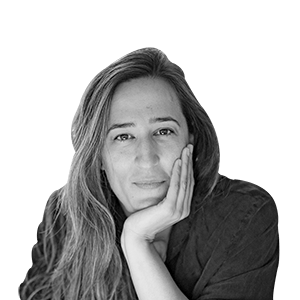Mar Griera: "The greatest threat to Catholicism is not Islam, it's the evangelical world."
Professor of Sociology


Mar Griera (Sabadell, 1978) is a professor of sociology and director of the ISOR research group on the sociology of religion.
Is religion compatible with a world of scientific advances?
Sometimes it's presented as an opposition. If you're a scientist, you're not religious, and if you're religious, you're not a scientist. And that's not the case.
How is?
The most evangelicals in the United States don't believe in the theory of evolution, but they do believe in antibiotics. Those most critical of vaccines define themselves as spiritual but not religious. Those who question climate change data are more evangelical than Catholic.
And what do those who don't believe in the theory of evolution believe? That we came from a rib?
They develop much more elaborate theories. In the United States, there's the theory of intelligent design, which states that some elements of nature are so complex that they couldn't have formed naturally, and that there must be someone superior.
Why does it happen?
Years ago, people talked about the information deficit. The idea was: if people have information, they'll get vaccinated. We're seeing that's not the case, and sometimes there are reconstructions of alternative theories that persist in certain groups.
What is believing?
It's difficult; we're in a time of transformation in which traditional categories are shifting. Before, belief was a religious identity conveyed through a single institution. Today, this is dislocated.
Why has the Church lost weight?
Due to the historical and political erosion of the role it played during the dictatorship. There hasn't been a transition that has allowed a more modern institution to emerge. Added to this is the crisis of institutions in general.
And it wasn't like that.
Between 15% and 20% of the population remains atheist, fairly stable. But the number of grays is increasing.
Like which ones?
An agnostic who doesn't deny the existence of God can go on a yoga retreat and chant mantras, another who participates in ayahuasca rituals, or perhaps someone who runs ultramarathons and seeks meaning in sports. And it is here, in this search for meaning, that the Church's monopoly has been broken. There are many spiritual offerings that can fill the void left by the institution.
In fact, the evangelical Church is growing a lot.
And it's happening everywhere, but especially in Latin America and Africa. In Brazil, it's brutal, and in fact, many analysts say Bolsonaro's victory is explained by the growth of the evangelical community.
That is, it has a political reading.
Conspiracy theories claim that the United States promoted the growth of the evangelical movement in Latin America to curb liberation theology. What is clear is that the expansion is very rapid and easy to understand.
How is it understood?
The Catholic Church has a vertical authority. And it functions more like an administration: that is, if you want to open a church, you have to ask for permission. With evangelicalism, I can open a space in the Civic Plaza of the Autonomous University, say that God has spoken to me, and preach. If people come, I have a church. And on a doctrinal level, it's also much more flexible. Today, some churches have grown so much that they are truly multinationals. Islam is often spoken of as a threat to Catholicism, and its greatest threat is the evangelical world.
And why is Buddhism successful?
They are skilled at spreading their discourse amidst the globalization of the religious market. And furthermore, it somehow fits with the nature of a neoliberal subject in a lost world. There is no such thing as a god, but rather one linked to the subject's experience…
Is it the religion that best fits capitalism?
With the neoliberal mentality of "be yourself, be free, find your wisdom, etc." But it's Buddhism lite. That is, people don't become Buddhist nuns. And there may even be a mix.
What does mixture mean?
Have you heard of the Saint of Hugs? She's an Indian woman whose name makes people wait in line for hours to receive a hug.
Why do they do it?
It's also the question I asked myself during fieldwork. And I found there were people of all religious denominations. What persists in a secularized society is a search, sometimes even a desperate one, for meaning. And today, there's no clear institution that provides it.
Is a strong Church compatible with a democratic society?
If there is a symbiosis between state and Church, it is much more difficult for a democratic society to exist or emerge. There is a very tenuous gray area between state and religion. And this is complicated in societies like Catalonia, where 7% of the population declares itself Muslim and 4% 100% Protestant, but where neither religion enjoys the support that the Catholic Church does. So the question is no longer whether society should be more or less secular, but rather what role other religious denominations should play.
